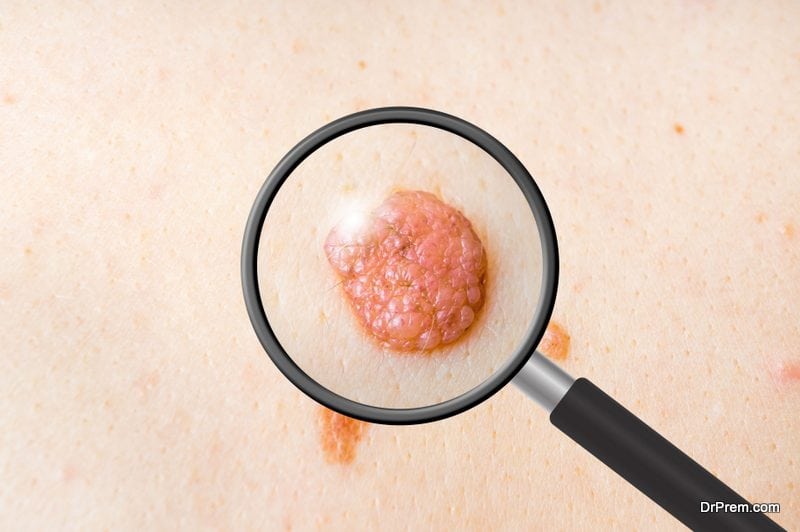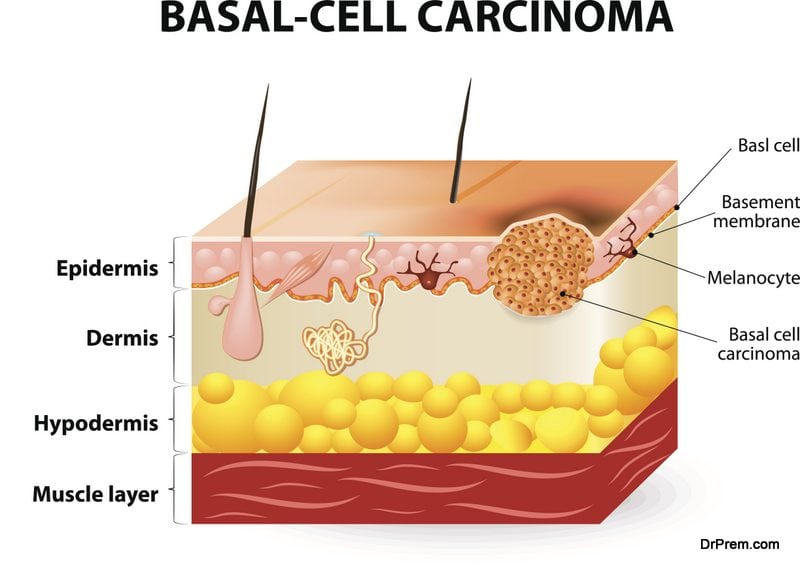Higher incidences of cancers other than the most commonly exhibited skin cancers have compelled scientists to find out whether can skin cancers lead to other cancers. A recent investigation in this regard seems to be supporting to the proposed hypothesis.
Background
 Centre for Disease Control has proposed skin cancers to be one of the most common cancers that can metastasize very easily intoother secondary cancers, like melanoma and colon cancer risk. In fact, statistics have suggested that each year more skin cancer cases are emerging that have outnumbered combined cases of breast, prostate and lung cancers.
Centre for Disease Control has proposed skin cancers to be one of the most common cancers that can metastasize very easily intoother secondary cancers, like melanoma and colon cancer risk. In fact, statistics have suggested that each year more skin cancer cases are emerging that have outnumbered combined cases of breast, prostate and lung cancers.
Skin cancers are commonly being categorized into melanoma cancers and non-melanoma cancers; out of which non-melanoma cancers are observed to be more common. Non-Melanoma cancer also commonly identified to be the basal cell carcinoma or squamous cell carcinoma are found to be evident in 1 out of 5 people in his or her entire lifetime.
Facts that you should know about
Further to which, it should be noted that almost 98% of the skin cancers finally turn out to be basal cell carcinoma or squamous cell carcinoma and are completely treatable. Contrary to which, melanoma skin cancers are much less common; contributing to only about 1% of the total skin cancers.
However, considering the increasing evidence of other less common types of cancers; scientists are trying to evaluate whether having basal skin carcinoma increase the risk for melanoma. Various studies in this regard are ongoing, suggesting a possible link between basal skin cancers and melanoma and colon cancer risk.
Study Overview
 In order to find out whether can skin cancer leads to other cancers, various studies have been proposed and confirmed the same. Accordingly, a team of scientists from the National Cancer Research Institute of South Carolina obtained data from almost 20,000 study participants.
In order to find out whether can skin cancer leads to other cancers, various studies have been proposed and confirmed the same. Accordingly, a team of scientists from the National Cancer Research Institute of South Carolina obtained data from almost 20,000 study participants.
Does having basal skin carcinoma increase the risk for other cancers?
The data was obtained from follow up analysis of people with and without non-melanoma skin cancers, which was conducted for approximately 30 years or so. And what the study could confirm was:
- People are under double the risk of developing another type of cancers when they have been diagnosed with either basal cell carcinoma or squamous cell carcinoma.
- The study further claims that younger people between the age of 25-44 have higher chances of metastasis.
- The study was concluded by considering various parameters like age, sex, body mass index as well as sun exposure rate.
Although, scientists could confirm the relation between non-melanoma skin cancers and other types of cancers; they confirmed that these results have certain limitations and do not confirm whether can skin cancer leads to other cancers.
Further details that were reveled in the study
 The study further confirmed that men with the previous history of one of the two non-melanoma cancers are at increased risk of being diagnosed with secondary cancers, such as melanoma, colon cancer, etc.
The study further confirmed that men with the previous history of one of the two non-melanoma cancers are at increased risk of being diagnosed with secondary cancers, such as melanoma, colon cancer, etc.
The statistical analysis further revealed the dangerous facts of increased evidence of melanoma associated with lips, salivary glands along with myeloma as well as non-Hodgkin’s lymphoma; evidently in the patients with the previous history of non-melanoma cancers. While in search of can skin cancer lead to other cancers, the study further investigated that the risk of non-specific site cancers, like connective tissues etc. can also be increased.
Whereas in the case of females, the studies associated with can skin cancer lead to other cancer have shown that the risk is higher with basal carcinoma than squamous carcinoma. The risk is further observed to be associated only for the first four years of its diagnosis but not thereafter.
How the cancer risk increases?
Studies have evidently confirmed that various cancer and related recurrence are associated with different, variable risk factors; which could either be environmental as well as genetic. Certainly, risk factors associated with environmental issues can be altered or minimized, but that of genetic make-up can never be changed.
It should also be noted that both environmental, as well as genetic parameters, are interlinked, so it is not necessary that your genetic predisposition to a certain type of cancer confirms that you will be suffering with it. However, by having an idea of various risk factors associated, we can definitely treat them completely by diagnosing them early.
They can be noted as:
- UV Light Exposure
 Increasing exposure to harmful UV radiations of the Sun is experimentally suggested to be the major risk factor for many skin cancers, including basal as well as squamous cancers. And since sunlight is the main source of them, it is better to instantly avoid tanning of your skin to prevent skin cancers.
Increasing exposure to harmful UV radiations of the Sun is experimentally suggested to be the major risk factor for many skin cancers, including basal as well as squamous cancers. And since sunlight is the main source of them, it is better to instantly avoid tanning of your skin to prevent skin cancers.
- Lighter skin tone
Experts have confirmed the protective action of melanin through various studies. Melanin acts as a shield, further minimizing the penetration of UV radiations through the skin. Thus, studies pertaining to can skin cancer lead to other cancers have proposed that people with white skin are in more danger due to reduced melanin content.
- Age
The risk of basal as well as squamous carcinoma is found to be more in people with higher age. Scientists are trying to justify this by pinpointing at built-up tanning beds on the skin due to long-term sun exposure. In fact, statistics has as well proved that male is at higher risk than female due to an increased period of being under the influence of UV rays due to dangerous habits like smoking.
- Chemical Exposure
 Moreover, long-term exposure to radioactive chemicals and arsenic could be dangerously leading to skin cancers. Arsenic is commonly used in the production of pesticides. Thus, male workers working in certain industries like coal tar, paraffin, oil industries etc. are more prone to be affected with skin cancer.
Moreover, long-term exposure to radioactive chemicals and arsenic could be dangerously leading to skin cancers. Arsenic is commonly used in the production of pesticides. Thus, male workers working in certain industries like coal tar, paraffin, oil industries etc. are more prone to be affected with skin cancer.
- Compromised immune system
The immune system can protect the body against the dangerous cancerous growth of the cells, through appropriate regularization. However, people with compromised immunity, especially due to chemotherapy or consumption of immunosuppressive drugs etc. are at increased risk of developing cancers.
Conclusion
The studies have offered a detailed insight into disease etiology and associated manifestations; and have modestly confirmed the association of the previous occurrence of skin cancers with an exhibition of secondary cancers.
However, experts are demanding for more detailed analysis by conducting various other related studies. This will be helpful in getting in depth information about the underlying mechanism of action. Thus, they have further recommended more elaborate study plan with the need for extended follow-up period.


